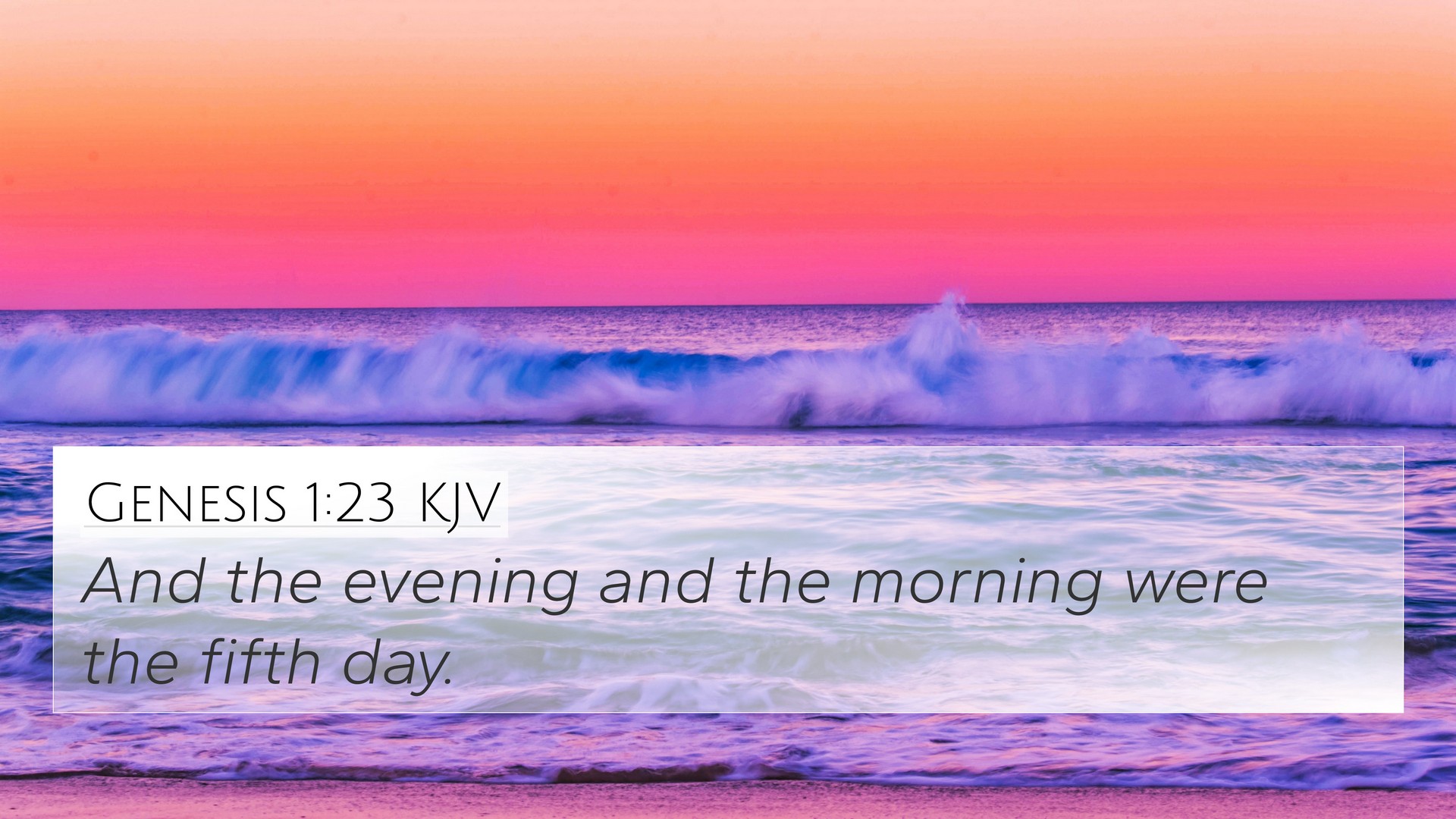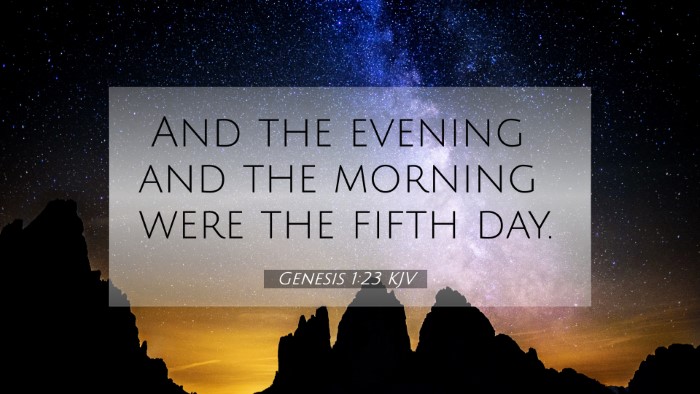Genesis 1:23 - Interpretation and Meaning
Verse: "And there was evening, and there was morning, the fifth day." - Genesis 1:23
This verse concludes the account of the fifth day of creation, reflecting the pattern established throughout Genesis 1. As we explore the meaning and significance of this verse, we can draw insights from notable public domain commentaries like those by Matthew Henry, Albert Barnes, and Adam Clarke.
Commentary Insights
Matthew Henry on Genesis 1:23
Henry emphasizes the systematic nature of God’s creation, highlighting the rhythmic structure of the days. He notes that each day ends with a declaration of “evening” and “morning,” marking the completion of God’s creative work. The term “fifth day” signifies the progress of creation and the importance of preparation as God sets the stage for both the creatures of the sky and the sea. The mention of “evening” and “morning” introduces a cycle of time established by God, suggesting His sovereignty over all creation.
Albert Barnes on Genesis 1:23
Barnes reflects on the significance of marine and avian life, indicating that the creation of fish and birds on the fifth day demonstrates God’s diversity in creation. He points out that both types of creatures were created to inhabit their respective domains—water and air. Additionally, Barnes notes the importance of this order in God’s creation, which prepares the Earth for the crown of creation—humankind. The closing of the day with “evening” and “morning” reinforces the structured timeline of creation, meant for both divine and human reflection.
Adam Clarke on Genesis 1:23
Clarke discusses the terminology used in the verse, emphasizing the key components of creation and their theological implications. He suggests that the specific mention of the “fifth day” relates not only to the creation events but also to a pattern that resonates throughout the biblical narrative. The structure of the day reflects God’s ongoing work in creation, and it evokes a sense of anticipation for the subsequent creation of man. Clarke also underlines the importance of recognizing transitions in the creation account, urging readers to consider how these moments connect with broader biblical themes.
Bible Verse Cross-References
To deepen our understanding of Genesis 1:23, several Bible verses provide valuable cross-references reinforcing the themes of creation and divine order:
- Psalm 104:25-26: Reflects on the vastness of creation.
- Job 38:41: Questions regarding the sustenance of creatures point to God's providence.
- Isaiah 40:26: Acknowledges God as the creator of all stars and celestial bodies.
- Matthew 6:26: Jesus encourages consideration of birds as examples of God's care.
- Acts 17:24-25: Highlights God as the creator who does not need anything from His creation.
- Revelation 4:11: Acknowledges God's worthiness due to His role as Creator.
- John 1:3: Affirms that all things were made through Christ, emphasizing His divine role in creation.
Thematic Connections
The recurring phrase “evening and morning” throughout the creation account points to the structure, rhythm, and intentionality underlying God’s creative work. This cyclical nature prompts a deeper reflection on the relationship between God and creation:
- Creation as Order: God's work reflects an inherent order characterized by cycles.
- Creation as Preparation: Each day builds upon the last, leading toward the creation of humankind, which disrupts the expectation of creation as merely functional.
- Creation and Divine Care: It serves to remind believers of God’s ongoing providence and involvement in the world.
Comparative Bible Verse Analysis
By connecting Genesis 1:23 with other scriptures, we can derive a deeper understanding of themes such as divine authority, the value of creation, and God’s providential care. Cross-referencing provides a way to identify connections between Old and New Testaments, revealing the continuity of God's plan throughout Scripture.
Conclusion
Genesis 1:23 serves as a pivotal verse in the creation narrative, encapsulating critical truths about God’s nature and His creative work. By engaging in a comparative Bible verse analysis and utilizing tools for Bible cross-referencing, readers can enhance their understanding of Scripture and appreciate the interconnectedness of biblical teachings.
Tools for Bible Cross-Referencing
To explore more about cross-referencing Bible verses, several resources can aid in study:
- Bible Concordance
- Bible Cross-Reference Guide
- Bible Reference Resources
- Comprehensive Bible Cross-Reference Materials
- Bible Chain References


